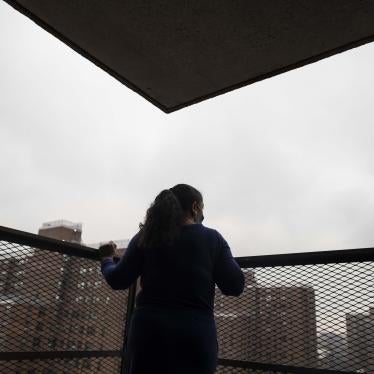On 25 September at a public square in Moscow, Artyom Kamardin participated in a poetry reading to protest Russia’s war in Ukraine. Kamardin, 32, began by saying: “Don’t follow illegal orders [to take part in the invasion] … Freedom for Russia, peace for Ukraine!” He then read his poem, which criticised the war. The police response was swift, brutal and demonstrative. It was also consistent with other police abuse against people who publicly object to Russia’s war.
That night, police arrested five people who had allegedly been at the reading. The next day, police raided Kamardin’s home, with a camera crew tagging along, filming on their phones. The police beat the three people they found in the apartment, including Kamardin’s girlfriend. They threatened to rape her, superglued stickers to her face, and showed her videos of officers beating Kamardin in the next room.
A video quickly appeared on social media, showing Kamardin – his eyes half closed, visibly beaten, with fresh cuts on his face, handcuffed, on his knees – apologising for his poetry and promising never to participate in political activities again.
During his hearing before a judge on 28 September, Kamardin wore clothes stained with blood and had clear injuries on his face. He said the police tortured him into a recorded “apology”.
The police investigator stated that the police were within their rights to use force and denied any wrongdoing. The judge added most of the documents to the case file but did not order an investigation into Kamardin’s treatment.
The investigator asked the judge to take into account “the political situation in the country”. The judge sent Kamardin and two others to pretrial custody for two months on charges of inciting hatred toward “members of the … armed groups of the Donetsk and Lugansk People’s Republics”, areas of Ukraine currently occupied by Russia. He is currently being held in Moscow’s notorious Butyrka pre-trial prison.
Three weeks later, the defence is still waiting for law enforcement authorities to set up a forensic medical exam. The report would be an important piece of evidence to hold Kamardin’s police assailants to account. Recent cases do not inspire confidence that this will happen.
Russia has a long record of police violence and other abuses against peaceful protesters. The abusers are rarely punished. Anti-war activists are one of the most recent targets. Videos circulated of police viciously beating anti-war protesters on 6 March with batons, punching them in the face and using electric shocks on those already on the ground.
The mistreatment on 6 March continues in police detention. Two female activists managed to record their police interrogations, while their attorneys were kept out, as is routine in political cases. “Do you think I will be punished somehow? Putin told us to kill you [all]. Putin is on our side. You are enemies of the state. You are enemies of the nation,” the policemen are heard saying in the recording, between blows, insults, and threats of torture. “There is no law in here,” they tell another detainee before threatening to shoot her.
In July, the prosecutor’s office acknowledged the audio recordings, witness statements and medical records detailing the injuries, but concluded the complaints did not contain evidence of a crime. Seven months later, the activists have identified their abuser, who continues to walk free.
In a third incident, in September, activist Alena Zotova says she was insulted and threatened by a police officer, after being detained in the city of Vladimir near an upcoming anti-‘mobilisation’ rally. She told me policemen demanded that she undress and, when she refused, forced a female officer to strip-search her while they stood outside the door laughing. Police also threatened her with sexual and other violence.
Zotova filed a criminal complaint but believes the police and investigators are trying to cover up the case. They wouldn’t give her a copy of her own statement, refused to admit physical evidence, and banned the shopping mall from giving her the CCTV recordings of her arrest. Several years ago, the same officer was accused of threatening a male activist, who was 15 at the time, with rape and enforced disappearance. The activist filed complaints – to no avail.
Torture and ill-treatment of people in custody is not new in Russia. In 2018, the UN Committee Against Torture roundly criticised Russia’s failure to address the issue noting “numerous reliable reports of the practice of torture and ill-treatment” – including against protesters and political opponents. Civil society organizations, such as the Public Verdict Foundation, point to the authorities’ “inability or unwillingness” to conduct proper investigations.
Violating the personal dignity and integrity of people opposed to the war is yet another tool that Russian law enforcement is using as punishment for anti-war speech. In particular, a recent Organization for Security and Co-operation in Europe report notes that sexualised police violence against female protesters in Russia is “more noticeable since February 2022.”
Russia should fulfil its obligations under domestic and international law and end the use of force against peaceful protesters. It should denounce and end impunity for torture and other cruel, inhuman and degrading treatment of those in custody, especially critics of the government.
Someday there will be a reckoning for the monstrous abuses the authorities have committed since 24 February, and the torture of Artyom Kamardin will be part of it.







